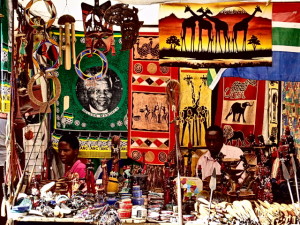People and Culture in South Africa
South Africa is one of the most culturally diverse nations in the world. Often referred to as the “rainbow nation”, South African citizens are an eclectic blend of a variety of ethnic, racial, linguistic, and religious differences. South Africa has 11 official languages! English is the language of administration and is spoken throughout the country. The other official languages are: Afrikaans, Ndebele, Northern Sotho, Southern Sotho, Swazi, Tsongo, Tswana, Venda, Xhosa and Zulu. In addition to the indigenous black peoples of South Africa, colonialism and immigration have brought in white Europeans, Indians, Indo-Malays, Chinese, and many more.

Ethnic Make-up: black 79.2%, white 8.9%, Coloured (mixed race) 8.9%, Indian or other Asian at ~2.6%
#CISAlumniTip
“Do your best to fully immerse yourself in the culture and take advantage of the opportunities abroad. This is your chance to experience many new things: new people, new food, new places, new traditions, new languages, new everything! Even if you feel physically or emotionally tired, get out there, leave your fear at home, and bring a positive attitude. Don’t take anything for granted. Even the most seemingly insignificant experience will become a highly valuable memory in the future.” – Debora C., Intern in Barcelona Alumna.
South African Society & Culture
The basic unit of South African society is the family, which includes the nuclear family and the extended family or tribe. In traditional African society, the tribe is the most important community as it is the equivalent of a nation. The tribe provides both emotional and financial security in much the same way the nuclear family does to white or coloured South Africans.
The coloured and more traditional Afrikaans cultures consider their extended family to be almost as important as their nuclear family, while the English-speaking white community places more emphasis on the nuclear family.
The nuclear family is the ultimate basis of the tribe. The tribal and family units are being disrupted by changes in the economic reorganization of the country.
As more people move into the urban areas, they attempt to maintain familial ties, including providing financial support to family members who have remained in the village.
The Rural/Urban Dichotomy
There are vast differences between the values of the rural and urban dwellers.
The majority of the whites living in rural areas are Afrikaner farmers who are descended from the Calvinists. Their views on the world are sometimes narrow. At the same time they value human decency over materialism.
City dwellers live life in the fast lane, which affects their outlook.
People from Johannesburg can quite often be regarded as having materialistic values, and being more interested in what you own rather than who you are. They prefer to see themselves as urbane and their country cousins as less sophisticated.
People from Cape Town are very proud of their city. Family ties, long-term friendships, and social standing are all important to Capetonians.
The many rural black communities are still rooted in the traditions of their heritage, whereas the increasingly urban black community combines their roots with the urban environment and international influences that surround them.
Etiquette & Customs in South Africa
Meeting Etiquette
There are several greeting styles in South Africa depending upon the ethnic heritage of the person you are meeting.
- When dealing with foreigners, most South Africans shake hands while maintaining eye contact and smiling.
Some women do not shake hands and merely nod their head, so it is best to wait for a woman to extend her hand. - Men may kiss a woman they know well on the cheek in place of a handshake. Greetings are leisurely and include time for social discussion and exchanging pleasantries.
- “Howzit?” meaning “how’s it going?” is a popular phrase used by South African youth to greet one another.
Dining Etiquette
If you are invited to a South African’s house:
- Arrive on time if invited to dinner.
- Contact the hostess ahead of time to see if she would like you to bring a dish.
- Wear casual clothes. This may include jeans or pressed shorts. It is a good idea to check with the hosts in advance.
- Offer to help the hostess with the preparation or clearing up after a meal is served.
For more information on social life and culture in South Africa, check out the link below!
South African Cultural Experiences
